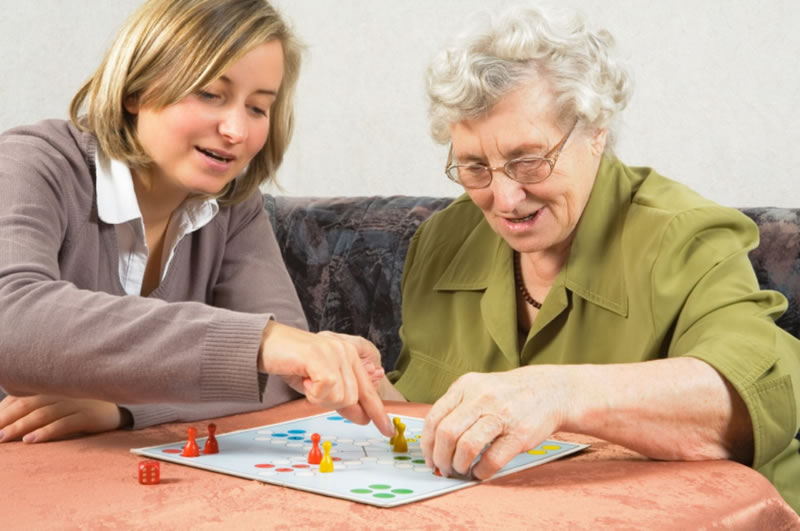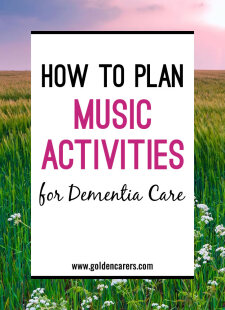8 Tips for Successful One-on-One Visits

It is not uncommon for seniors living in long-term care homes to lack mental stimulation and social contact, especially those who are naturally introverted or have lived alone for extended periods. They may choose to stay in their rooms all day and decline to participate in programmed activities.
One-on-one visits provide a meaningful way to connect with these individuals, offering personalized attention and opportunities for trust-building.
Related: 15 Activities for Loners and Introverted Seniors
The Benefits of One-on-One Visits
- Tailored interactions for those who avoid group activities.
- Opportunities to keep minds and bodies active through enjoyable activities.
- Helps build rapport and trust, fostering a sense of connection and care.
8 Tips for Successful One-on-One Visits
1. Put Yourself in Their Shoes
Think about the resident’s interests or hobbies beforehand by reviewing their profile. Consider topics or activities that might resonate with them.
2. Early Morning is Best
Schedule visits when residents are most alert, such as early morning or mid-afternoon after lunch and rest. Add a personal touch by sending a note in advance to let them know you’re coming.
3. Eye Contact is Important
Greet them warmly, make eye contact, and sit at their level to create a sense of connection and ease.
4. Use Props
Bring conversation starters like flowers, seasonal items, magazines, or snacks. These can help spark memories and conversations.
5. Reduce Background Noise
Turn off TVs or radios and minimize distractions to help the resident focus on the interaction.
6. A Change of Scenery Can Be a Good Thing
If visits are usually in their room, try meeting in a garden, veranda, or other calming space for a refreshing change.
7. Pay Attention to Body Language
Be mindful of your body language and theirs. Genuine engagement is key, and if the resident seems tired or disengaged, reschedule the visit for a better time.
8. Be Patient
With residents who have dementia or memory loss, repeat conversations as needed. Use visual cues like photos or personal belongings to spark engagement.
10 One-on-One Activity Ideas

1. Read Aloud
Share a funny poem, story, or joke to lighten the mood.
Related: Poems to Share and Jokes for the Elderly
2. Play Games
Engage in simple board games or puzzles together.
Related: Games for Seniors
3. Enjoy Trivia
Bring trivia quizzes or word games to stimulate the mind.
Related: Word Games and Trivia
4. Look Through Photo Albums
Explore family photo albums or create a scrapbook together.
Related: Recycled Magazine Scrapbooks
5. Storytelling
Ask them to share stories from their life, such as childhood memories or past hobbies.
Related: Reminiscing Activities for Seniors
6. Bring Magazines or Books
Share materials tailored to their interests, fishing magazines for anglers or quilting books for crafters.
7. Learn About Their Culture
Discuss their background with facts or quizzes about their country or heritage.
8. Listen to the Radio
Enjoy music, audiobooks, or interesting talk shows together.
9. Spend Time Outdoors
Take a walk and reminisce about past experiences, like gardening.
Related: Outdoor Activities
10. Offer a Gentle Massage
Provide a relaxing hand or shoulder massage to promote comfort and relaxation.
Related: Hand Massage & Nail Care
What strategies and activities have worked well for you in one-on-one visits?
Share your experiences to inspire others!






I have so enjoyed reading all your comments and ideas and they are all wonderful. I believe as an Occupational Therapy Assistant here in Ohio, the use of self is one of the most powerful tools we have. Whether you are selecting an "occupation" something purposeful and/or meaningful to you or to them, collaboration is key. Recently I have gained an enthusiasm for gardening and crafting, as fundamental as these concepts are both personally and professionally, this year is different. The ability to participate in a task either using their hands, if they so choose, or simply their input on a task is priceless. Remembering how difficult of an adjustment it is to lose your abilities, tasks that once came easily and quickly now must be performed slowly and methodically to promote safety, may we continue to strengthen one another by sharing ideas so as not to fall into the "same old thing." Personally, I can't imagine a profession or a past time that could be more rewarding than what we do. Thanks for all your ideas. Ria in Ohio
Hi Ria
Thanks for your input and ideas
Mary
Care plan goals are different for each resident depending on what they like and their ability
Here is one example about Marie but probably the residents you’re talking about will be different
Staff will communicate with Marie in a calm and relaxed manner, giving her ample time to express herself and offering empathetic
encouragement.
Use these template but you will have to modify them to suit the needs and wishes
Marie will be engaged in a variety of ADLs (activities of daily living) several times a day to diminish difficult behaviour e.g.
having hair combed and 'set'
hanging out clothes to dry
folding clothes
wiping and dusting shelves
tidying out handbag
washing and drying dishes under supervision
Staff will spend extra one-on-one time with Marie in the afternoons taking her for a walk and/or engaging her in conversation to distract her from cognitive stress.
At least 3 times a week, Marie will be involved in an activity she really enjoys; such as dancing with staff to the sound of country music.
Marie will be actively engaged in 'helping' staff to prepare for Church Services e.g. picking and arranging flowers.
https://www.goldencarers.com/get-download.php?fid=1335&pid=3249
https://www.goldencarers.com/pdf/3249/
Does anyone have a sample of a 1:1 Care plan goal?
Hi, Mary. The link below will help you with Care Plan goals and interventions 1:1https://www.goldencarers.com/care-plan-goals-interventions/3332/
Thanks for sharing these awesome ideas. Yes, I have experienced in visiting in the morning, it is extremely the best idea to make the senior's day wonderful.
Here is an article that can help you
https://www.goldencarers.com/12-tips-for-writing-progress-notes/5442/
Can someone please give me an example of a one to one note. I am new to this in Illinois and preparing for state and I am not sure if they are being documented correctly. Thank u
Could you please give me some examples to write in progress notes about the 1:1 visits for people doesn't want to participate in activities or some tips please thanks gladyz
My mother is 88, still loves at home. My brother works out of the home office 5-6 days a week, often spends the night there or takes her out of town on the weekends. I live out of tow, 2-4 hour drive one way, so I can only come down once or twice a month for a couple of days at a time. My other 2 siblings live in town but work full time so it's hard for them to be there every day. My mom has PT twice a week, someone comes to the house twice a week to do swimming exercises and we have someone come over twice a week to take her grocery shopping or run errands or help around the house. Practically every day my mom is emptying drawers and closets, getting rid of new and good item, as well as many items we are donating. We are finding perfectly good items in the trash too. She has a rather large house and many items and it's driving my brother crazy and some closets she has emptied 7 times, and she can't remember. She has lost all interest in socializing with any friends. I would like to hire someone that would be like a caring angel to just come and interact with her, play a game, etc so she stays out of trouble when family can't be with her. If I lived closer and did not have a family of my own and work, I would be there more often. Any suggestions on who I can hire? She lives in San Diego.
Hi Georgia, it sounds like a challenging time. This would be a great question to ask on our facebook group page: https://www.facebook.com/groups/ActivitiesForSeniors/
I wish you all the best.
Wonderful suggestions
Thanks for your feedback Tena
I tried playing word games solving puzzles. Chatting with them. Some help in foldings or sorting more of a functional activity. Generally it can be 5 to 10min. But even if you had a chat it can be social and emotional support.
There are no time frames under ACFI as there was under Question19 when the funding system was RCS. Obviously you cannot do a good job my saying hi and walking out the door without spending time addressing the identified issue with the client.
to Kerry; 1:1 room visits. should be between 10 to 15 minutes.
one on one room visit / 1:1 interaction are very important part for long term resident living in facilitates. As this help to give resident a social and emotional support that may require when resident does not participate in general activities is lonely or depressed, confused, scared, angry, frustrated weepy, anxious. In this way recreational staff can implement special program or games interested to the resident and given them the opportunity to reminisce and to build on self esteem.
Regards
Morena
In response to Kerry, 1:1 duration or frequency is not prescribed by the accreditation agency. A smile and a quick hello also constitutes 1:1 interaction. If a residents is specifically visited for behaviour intervention (such as identified social isolation) for any number of minutes this ought be recorded as behaviour intervention strategies rather than a 1:1 visit. This way you can evaluate the effectiveness of your intervention when you complete your Resident Of the Day, Evaluation or Review process. Thus demonstrating [for accreditation and client monitoring purposes]continuous improvement and your also ensuring you have identified your Elders corrects needs and addressed them in the appropriate fashion.
These are terrific ideas.1on1 visits are not always easy to conduct.your suggestions give some great ideas for breaking the ice.I will certainly give them a go.Thank you.
this is such a great tip, so many times i am asked how to talk to people 1-1, and its hard to just come up with the right answer on the spot. I find it very easy to talk to people, but then again i have been in this job as a DT for almost 16 years and neary 20yrs in Aged Care. Newbies could learn a great deal from this. Thanks again.
Can you please tell me if 1:1 visits must last at least 15 minute duration for it to be recorded as 1:1. Thanks Kerry